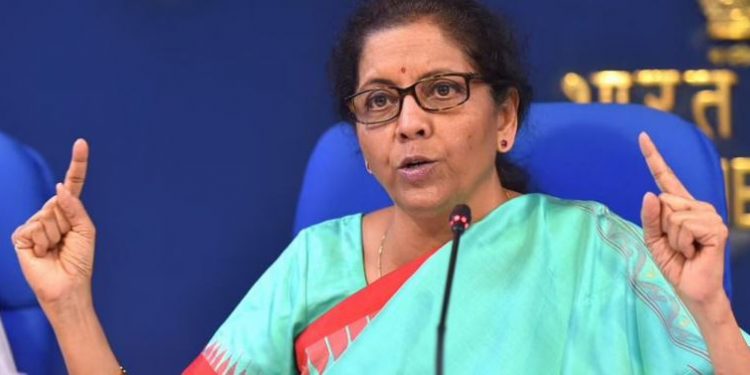New Delhi: With a view to enhance the investment climate in the country in the wake of strong recovery and the opportunities accorded by a shift in geo-political realities post the Covid-19 pandemic, Union Finance Minister Nirmala Sitharaman Monday virtually interacted with the Chief Ministers and Finance Ministers of all the states along with Lieutenant Governors of the UTs.
The meeting was attended by the Chief Ministers of Assam, Chhattisgarh, Goa, Haryana, Himachal Pradesh, Karnataka, Madhya Pradesh, Manipur, Meghalaya, Mizoram, Nagaland, Puducherry, Sikkim, Tripura and Uttar Pradesh, along with the Lt Governors of Jammu and Kashmir, and Deputy Chief Ministers of Arunachal Pradesh, Bihar, and Delhi.
State Finance Ministers of Andhra Pradesh, Gujarat, Kerala, Odisha, Punjab, Rajasthan, Tamil Nadu, Telangana, Uttarakhand, West Bengal; and state government officials of Ladakh, Maharashtra, Jharkhand, Andaman and Nicobar, Chandigarh, Dadra and Nagar Haveli and Daman and Diu, and Lakshadweep also attended the meeting.
In her opening remarks, Sitharaman emphasised that the economy has been growing significantly post the second wave of the Covid-19 pandemic and indicators such as imports, exports, PMI manufacturing, digital payments, etc. have already reached pre-pandemic levels.
Sitharaman highlighted that with favourable international perception of India’s growth and in light of the structural, sectoral abd financial reforms undertaken by the government of India, global and domestic investors are upbeat about the investment attractiveness of the country.
The states should leverage this opportunity to scale up investments and growth, she said.
The Finance Minister also said that the government of India has taken concrete steps to increase capital spending and drive an infrastructure and investment-led growth.
Benefits of higher investment in infrastructure manifest in the form of increased employment opportunities, access to market and materials, improved quality of life and empowerment of vulnerable sections, she said.
The Union budget for FY2021-22 has allocated Rs 5.54 lakh crore capital outlay, an increase of 34.5 per cent over last year. Additionally, around Rs 2 lakh crore allocation is for states and autonomous bodies for their capital expenditure. Over and above this, a new incentive scheme was launched by the government for states that could achieve at least 15 per cent of the target set for FY21-22 by the end of the first quarter, 45 per cent by end of the second quarter, and 70 per cent by the end of the third quarter.
States that achieve their targets become eligible for incremental borrowing. After the end of the first quarter, 11 states got permission to mobilise an additional total amount of Rs 15,271 crore.
Sitharaman further said that the recently-launched national monetisation pipeline includes only Central government assets, while state assets have been out of its purview as of now.
The minister suggested that there is a significant potentially monetisable asset base in states which could be leveraged to enhance the capital available for new infrastructure creation and other social sector pressing priorities.
Sitharaman urged the states to help India become the fastest growing economy in coming years, through facilitating investment attractiveness and expediting ease of doing business measures and undertaking power reforms with regard to reduction in AT&C and ACS-RRR.
The Finance Minister further emphasised that since in many cases land is one of the major bottlenecks for project on-grounding, states must contrive to smoothen land acquisition procedures and create land banks to be tapped at the time of investment.
She urged the states to strengthen their urban local bodies (ULBs) in light of the fact that there has been decidedly a larger allocation to ULBs than earlier.
Since infrastructure projects require technical assistance in addition to financial resources, Sitharaman said that the line ministries and the Department of Economic Affairs would extend all possible cooperation for technical or advisory assistance to the states.
Moreover, the viability gap funding provision will help finance socially relevant but financially unviable projects, especially across social sectors.
The Finance Minister said that she is looking forward to listening from the states and understand their ideas and plans in the direction of investment enhancement.
In the open interaction, each of the states enumerated the list of reforms and pro-active policies they are pursuing to establish good governance and to facilitate investment.
Some of the ideas shared by by the states to facilitate investment promotion during the meeting were: Affidavit-based clearance system; Transparent mechanism for investment facilitation that involves sharing with states; leads of prospective investors who are in touch with the Centre etc.
The states also emphasised the need for a clear-cut policy and SOPs on environment and forest clearances by the government of India, on the lines of ‘Eco-Economics’, and more power to states under forest/environmental matters.
The states also sought fast-track clearance and approval for the externally-aided projects by the government of India.
The states also suggested the need for a legal reassessment and intervention on the legality of conversion of several different types of lands into industrial parks. They also said that there is a need to strengthen the dispute resolution mechanism, post-award contract enforcement etc.
The states sought continuation of the Centre’s scheme of loan for capital expenditure beyond the current financial year.






































